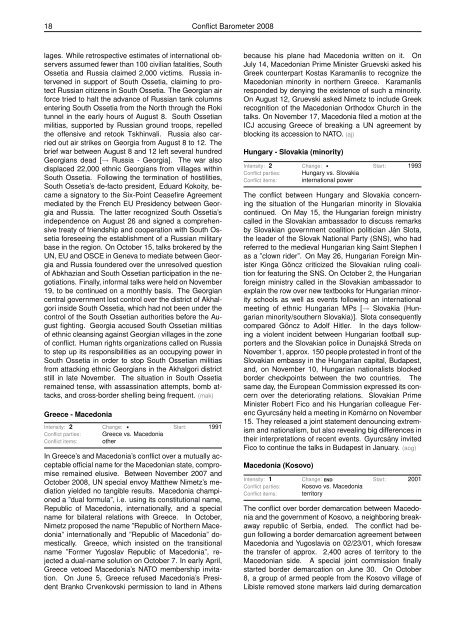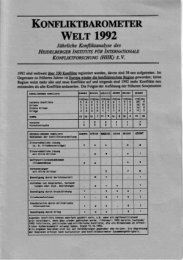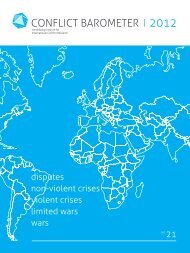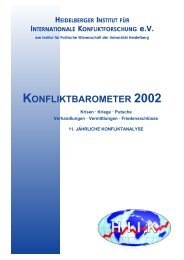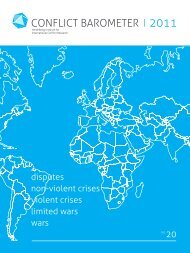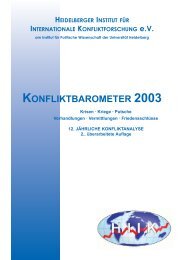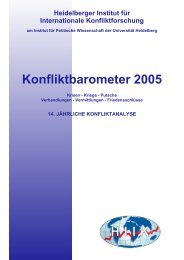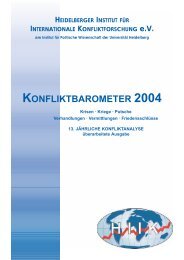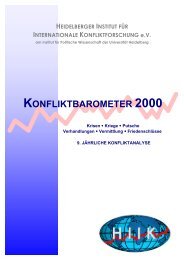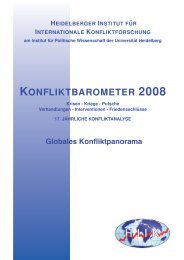CONFLICT BAROMETER 2008
CONFLICT BAROMETER 2008
CONFLICT BAROMETER 2008
Create successful ePaper yourself
Turn your PDF publications into a flip-book with our unique Google optimized e-Paper software.
18 Conflict Barometer <strong>2008</strong><br />
lages. While retrospective estimates of international observers<br />
assumed fewer than 100 civilian fatalities, South<br />
Ossetia and Russia claimed 2,000 victims. Russia intervened<br />
in support of South Ossetia, claiming to protect<br />
Russian citizens in South Ossetia. The Georgian air<br />
force tried to halt the advance of Russian tank columns<br />
entering South Ossetia from the North through the Roki<br />
tunnel in the early hours of August 8. South Ossetian<br />
militias, supported by Russian ground troops, repelled<br />
the offensive and retook Tskhinvali. Russia also carried<br />
out air strikes on Georgia from August 8 to 12. The<br />
brief war between August 8 and 12 left several hundred<br />
Georgians dead [→ Russia - Georgia]. The war also<br />
displaced 22,000 ethnic Georgians from villages within<br />
South Ossetia. Following the termination of hostilities,<br />
South Ossetia’s de-facto president, Eduard Kokoity, became<br />
a signatory to the Six-Point Ceasefire Agreement<br />
mediated by the French EU Presidency between Georgia<br />
and Russia. The latter recognized South Ossetia’s<br />
independence on August 26 and signed a comprehensive<br />
treaty of friendship and cooperation with South Ossetia<br />
foreseeing the establishment of a Russian military<br />
base in the region. On October 15, talks brokered by the<br />
UN, EU and OSCE in Geneva to mediate between Georgia<br />
and Russia foundered over the unresolved question<br />
of Abkhazian and South Ossetian participation in the negotiations.<br />
Finally, informal talks were held on November<br />
19, to be continued on a monthly basis. The Georgian<br />
central government lost control over the district of Akhalgori<br />
inside South Ossetia, which had not been under the<br />
control of the South Ossetian authorities before the August<br />
fighting. Georgia accused South Ossetian militias<br />
of ethnic cleansing against Georgian villages in the zone<br />
of conflict. Human rights organizations called on Russia<br />
to step up its responsibilities as an occupying power in<br />
South Ossetia in order to stop South Ossetian militias<br />
from attacking ethnic Georgians in the Akhalgori district<br />
still in late November. The situation in South Ossetia<br />
remained tense, with assassination attempts, bomb attacks,<br />
and cross-border shelling being frequent. (mak)<br />
Greece - Macedonia<br />
Intensity: 2 Change: Start: 1991<br />
Conflict parties: Greece vs. Macedonia<br />
Conflict items: other<br />
In Greece’s and Macedonia’s conflict over a mutually acceptable<br />
official name for the Macedonian state, compromise<br />
remained elusive. Between November 2007 and<br />
October <strong>2008</strong>, UN special envoy Matthew Nimetz’s mediation<br />
yielded no tangible results. Macedonia championed<br />
a ”dual formula”, i.e. using its constitutional name,<br />
Republic of Macedonia, internationally, and a special<br />
name for bilateral relations with Greece. In October,<br />
Nimetz proposed the name ”Republic of Northern Macedonia”<br />
internationally and ”Republic of Macedonia” domestically.<br />
Greece, which insisted on the transitional<br />
name ”Former Yugoslav Republic of Macedonia”, rejected<br />
a dual-name solution on October 7. In early April,<br />
Greece vetoed Macedonia’s NATO membership invitation.<br />
On June 5, Greece refused Macedonia’s President<br />
Branko Crvenkovski permission to land in Athens<br />
because his plane had Macedonia written on it. On<br />
July 14, Macedonian Prime Minister Gruevski asked his<br />
Greek counterpart Kostas Karamanlis to recognize the<br />
Macedonian minority in northern Greece. Karamanlis<br />
responded by denying the existence of such a minority.<br />
On August 12, Gruevski asked Nimetz to include Greek<br />
recognition of the Macedonian Orthodox Church in the<br />
talks. On November 17, Macedonia filed a motion at the<br />
ICJ accusing Greece of breaking a UN agreement by<br />
blocking its accession to NATO. (aj)<br />
Hungary - Slovakia (minority)<br />
Intensity: 2 Change: Start: 1993<br />
Conflict parties: Hungary vs. Slovakia<br />
Conflict items: international power<br />
The conflict between Hungary and Slovakia concerning<br />
the situation of the Hungarian minority in Slovakia<br />
continued. On May 15, the Hungarian foreign ministry<br />
called in the Slovakian ambassador to discuss remarks<br />
by Slovakian government coalition politician Ján Slota,<br />
the leader of the Slovak National Party (SNS), who had<br />
referred to the medieval Hungarian king Saint Stephen I<br />
as a ”clown rider”. On May 26, Hungarian Foreign Minister<br />
Kinga Göncz criticized the Slovakian ruling coalition<br />
for featuring the SNS. On October 2, the Hungarian<br />
foreign ministry called in the Slovakian ambassador to<br />
explain the row over new textbooks for Hungarian minority<br />
schools as well as events following an international<br />
meeting of ethnic Hungarian MPs [→ Slovakia (Hungarian<br />
minority/southern Slovakia)]. Slota consequently<br />
compared Göncz to Adolf Hitler. In the days following<br />
a violent incident between Hungarian football supporters<br />
and the Slovakian police in Dunajská Streda on<br />
November 1, approx. 150 people protested in front of the<br />
Slovakian embassy in the Hungarian capital, Budapest,<br />
and, on November 10, Hungarian nationalists blocked<br />
border checkpoints between the two countries. The<br />
same day, the European Commission expressed its concern<br />
over the deteriorating relations. Slovakian Prime<br />
Minister Robert Fico and his Hungarian colleague Ferenc<br />
Gyurcsány held a meeting in Komárno on November<br />
15. They released a joint statement denouncing extremism<br />
and nationalism, but also revealing big differences in<br />
their interpretations of recent events. Gyurcsány invited<br />
Fico to continue the talks in Budapest in January. (aog)<br />
Macedonia (Kosovo)<br />
Intensity: 1 Change: END Start: 2001<br />
Conflict parties: Kosovo vs. Macedonia<br />
Conflict items: territory<br />
The conflict over border demarcation between Macedonia<br />
and the government of Kosovo, a neighboring breakaway<br />
republic of Serbia, ended. The conflict had begun<br />
following a border demarcation agreement between<br />
Macedonia and Yugoslavia on 02/23/01, which foresaw<br />
the transfer of approx. 2,400 acres of territory to the<br />
Macedonian side. A special joint commission finally<br />
started border demarcation on June 30. On October<br />
8, a group of armed people from the Kosovo village of<br />
Libiste removed stone markers laid during demarcation


